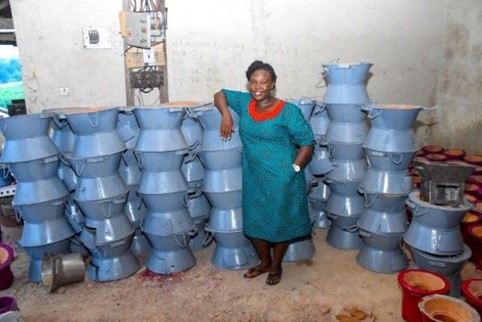Introduction of fuel-efficient cookstoves that reduce fuelwood consumption and carbon emissions. The stoves are also very affordable as they use local materials that can be sourced even in local communities.
Reducing Firewood for Cooking & Industries

Cooking accounts for 91% of total domestic energy consumption in Nigeria. Wood is the most widely utilized cooking fuel with over 70% using open firewood and 175 million Nigerians estimated to be vulnerable to illness and deaths from exposure to cooking smoke. 40MtCO2 emitted in 2020 mainly from cooking with traditional fuels such as firewood, charcoal and kerosene. Nigeria already stands as the country with the fastest deforestation rate. Wide-scale deployment of LPG for cooking and electric cooking is far from a reality in most parts of Nigeria; even in metropolitan cities with a relatively higher income, compared to far rural communities. Hence, it is only practical to focus on improving the efficient use of firewood and agricultural waste produce to significantly reduce the amount of wood used, as well as improve the health of women and children.
Introduction of fuel-efficient cookstoves that reduce fuelwood consumption and carbon emissions. Clean stoves have an efficiency rate of over 60% compared to open firewood cooking. The stoves are also very affordable as they use local materials that can be sourced even in local communities. Prices for the stoves are within the range of N5,000 and N8,000. With carbon credit, an average clean stove for a family can be accessed with N1,000.00.
Roshan has delivered over 43,400 clean stoves to women and communities in over 7 states and IDP camps across Nigeria.
According to testing at the Energy Research Center at the University of Nigeria, Nsukka, the Roshan stoves, known as Happy Stoves and available in four sizes, are 60 per cent fuel-efficient and achieve tier-four speed in a standard water boiling test. To date, Happy Stoves has manufactured and distributed around 45,000 stoves across Nigeria. Roshan also makes briquettes – about 400 kg per day – from agricultural waste (palm kernel shells and waste bamboo), replacing the need for charcoal made from trees. The briquettes have a high calorific value and are long-lasting, quick to heat, and cleaner burning than wood charcoal. Happy also manages empowerment programs for women, including savings and loan groups and a training program for Roshan sales agents.
Since starting Roshan Global Services in 2013, Amos, who is also the Managing Director of the company, has sold over 40,000 “Happy Stove” cookstoves. Amos has recruited more than 60 women as sales agents across Northern Nigeria and has trained over 350 women, including refugees, on the negative impacts of cooking with fuels like wood, charcoal, and animal dung.
The solution is in line with the set national climate and developmental goals. As of now, no legal requirement is needed to deploy clean stoves. Roshan has great expertise in making clean stoves. They are currently working with 300 women in Taraba through a savings loan group, and about 50% of them are small women farmers. In 2023 alone they have sold over 15,000 stoves, 10,000 under carbon credit and 5,000 under open market. Roshan has over 45 permanent staff and 50 ad-hoc staff.
Opportunities for clean stove businesses in Nigeria include:
- Large Market Potential: Nigeria has a significant population and a high demand for clean cooking solutions, presenting a substantial market opportunity.
- Government Support: The Nigerian government has shown commitment to promoting clean cooking technologies, offering incentives, subsidies, and policy support for the sector.
- Energy Transition Agenda: Nigeria's focus on transitioning to cleaner energy sources creates an environment conducive to the adoption of clean cooking stoves.
- Rural Electrification Initiatives: Leveraging ongoing rural electrification efforts presents opportunities for integrating clean cooking solutions with electricity access in rural areas.
- Partnerships and Funding: Collaborating with NGOs, development agencies, and impact investors can provide access to funding, technical expertise, and market connections for clean stove businesses.
Engage Roshan on project vision and goal and jointly agree on the mode of the business of deploying more stoves.

